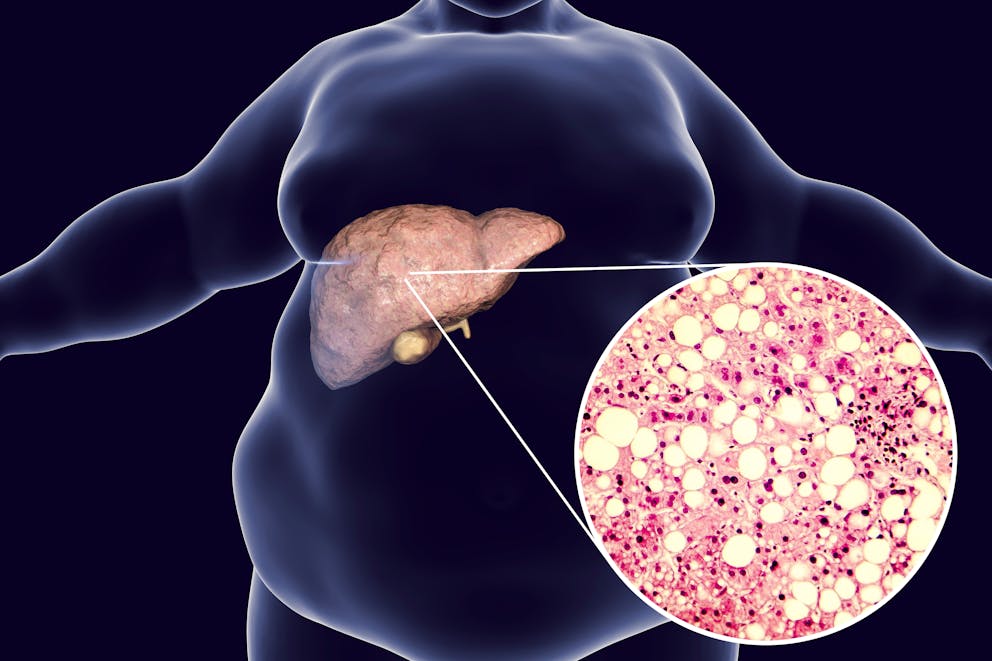Diet Soda can Cause a Fatty Liver
Many people turn to diet sodas believing they are making a healthier choice, but emerging research suggests there could be a link between diet soda and fatty liver disease.
This is concerning as more people are becoming conscious of their sugar intake. If you’re struggling with this, you are not alone.
The Hidden Dangers of Diet Soda and Fatty Liver
Diet sodas may appear harmless on the surface, but a closer look at their ingredients and how they affect the body reveals some startling potential health risks.
One of the biggest concerns with diet soda consumption is its association with fatty liver disease, a condition where fat builds up in the liver, potentially leading to liver damage.
How Diet Soda Affects Your Body
Unlike regular sodas that contain sugar, diet sodas are sweetened with artificial sweeteners like aspartame, sucralose, or saccharin.
Although they don’t directly contribute to calories, emerging research suggests that artificial sweeteners may negatively affect the body in ways that can lead to diet soda fatty liver.
One study even indicated that even small amounts of artificial sweeteners may be connected to a greater chance of developing non-alcoholic fatty liver disease. Diet sodas, similar to regular soda, do not offer any nutritional value and contribute empty calories.
They don't provide the vitamins, minerals, and fiber your body needs to function properly. Instead, they often replace nutrient-rich beverages like water, unsweetened tea, and even coffee.
Artificial Sweeteners: Are They As Sweet As They Seem?
The artificial sweeteners in diet soda trick your body into thinking it’s getting sugar, leading to disruptions in your metabolism and hormone balance.
This can result in increased cravings for sugary foods, negating any benefits you might have gained from cutting out sugar in the first place.
These sweeteners may also disrupt the delicate balance of your gut bacteria, known as the microbiome, impacting digestion, immunity, and even mental health.

Diet Soda Fatty Liver: Unraveling the Connection
Emerging evidence indicates a potential connection between long-term diet soda consumption and a higher risk of non-alcoholic fatty liver disease. The exact mechanism of this association isn't completely clear and more research is needed.
Some potential contributing factors might include the role artificial sweeteners play in metabolic changes, alterations to the gut microbiome, or increased inflammation. For individuals at risk of fatty liver disease, limiting or avoiding diet sodas is crucial.
Adopting a healthy lifestyle, including regular exercise, and a balanced diet rich in whole foods, is always a good idea.
Beyond Fatty Liver: Other Health Concerns Linked to Diet Soda
Besides the potential link between diet soda and fatty liver, research has indicated a connection between diet soda consumption and various health concerns, including:
Increased risk of type 2 diabetes
Weight gain and obesity, particularly abdominal obesity, which increases the risk of heart disease and other metabolic issues.
Increased risk of stroke, particularly in women.
Increased risk of heart disease.
Tooth enamel erosion from the acidity in diet sodas.
The Impact of Sugar on Liver Health
It's important to note that while artificial sweeteners in diet soda may play a role in liver health, consuming excessive sugar is also detrimental to your liver and overall well-being.
Fructose, a type of sugar found in many processed foods and beverages, is primarily processed in the liver. When consumed in excess, the liver converts it into fat, which can accumulate, leading to fatty liver disease and other metabolic problems.
Practical Tips to Reduce Your Diet Soda Intake
Quitting diet soda might sound daunting, but taking gradual steps can pave the way for a smoother transition. Reducing your diet soda intake can have significant benefits for your health.
Start Small: Gradually decrease your diet soda intake instead of going cold turkey. If you typically drink two cans a day, try cutting down to one.
Hydrate Smart: Make a conscious effort to drink more water throughout the day. Often, we mistake thirst for hunger, so staying hydrated can help reduce your craving for soda.
Explore Alternatives: Consider trying other, healthier beverages like herbal teas, infused water, or sparkling water with a splash of lemon or lime juice for flavor. These options provide hydration without the added sugars or artificial sweeteners.
Breaking any habit takes time and effort. Listen to your body, find healthy alternatives you enjoy, and stay committed to your well-being. Reducing or eliminating diet soda can positively impact not just your liver but your overall health and quality of life.
What are the signs of fatty liver disease?
In the early stages, fatty liver disease often doesn’t cause noticeable symptoms. However, as the condition progresses, you might experience:
Fatigue
Abdominal pain or discomfort, particularly in the upper right side
Loss of appetite
Yellowing of the skin or eyes (jaundice)
Swelling in the legs or abdomen
If you experience any of these symptoms, especially if you’re at risk of fatty liver disease, it’s important to consult your doctor for proper diagnosis and treatment. They can help assess your liver health and recommend appropriate lifestyle changes or medical interventions.

Can fatty liver be reversed?
The good news is that fatty liver disease is often reversible with early detection and lifestyle modifications. While there's no specific medication to cure it, addressing the underlying causes can effectively reverse the damage.
Here are some ways to potentially reverse fatty liver disease:
Weight loss: Losing even a small amount of weight, such as 7-10% of your body weight, can significantly reduce liver fat. Gradual and sustainable weight loss through diet and exercise is key.
Healthy diet: Focus on a balanced diet rich in fruits, vegetables, whole grains, lean proteins, and healthy fats. Limit saturated and trans fats, added sugars, and processed foods.
Regular exercise: Aim for at least 150 minutes of moderate-intensity exercise or 75 minutes of vigorous-intensity exercise per week. Consult your doctor before starting any new exercise regimen.
Alcohol cessation: If you consume alcohol, it's best to abstain or limit your intake to moderate levels, as recommended by your doctor.
Manage underlying conditions: If you have other health conditions like diabetes, high cholesterol, or high triglycerides, managing them effectively can contribute to reversing fatty liver disease.
Reversing fatty liver disease requires commitment and consistent effort, but the potential benefits for your liver health and overall well-being are well worth it. By adopting a healthy lifestyle, you can significantly reduce your risk of complications and enjoy a healthier future.
Can coffee help with fatty liver?
While excessive caffeine consumption can have negative health effects, studies have shown that coffee, in moderation, might offer protective benefits against fatty liver disease.
Coffee contains antioxidants and other beneficial compounds that may help protect the liver from damage.
Research suggests that coffee consumption might be associated with a lower risk of developing fatty liver disease and a slower progression of liver fibrosis (scarring) in those who already have it.
However, it's essential to enjoy coffee in moderation and be mindful of added sugar, cream, or sweeteners that can negate its potential benefits. Opt for black coffee or use natural sweeteners sparingly.
As always, consult your doctor before making any significant changes to your diet, especially if you have any underlying health conditions.
Evaluating the Role of Diet in Liver Health
When examining the potential impacts of diet soda on liver health, it's also worth considering broader dietary patterns, such as a pescatarian diet, that may support liver function.
While diet sodas are often linked to negative effects like fatty liver due to artificial sweeteners and chemicals, adopting a diet rich in whole foods, such as the pescatarian diet, can help counteract these effects.
This diet emphasizes fish, which provides omega-3 fatty acids known for their anti-inflammatory properties, alongside vegetables and legumes that support liver detoxification.
By focusing on natural and nutrient-dense foods, you can help protect your liver and improve overall health.
Conclusion
Diet sodas might seem like a harmless way to quench your thirst without the sugar rush, but evidence is increasingly showing a potential connection between diet soda and fatty liver and other health risks.
While artificial sweeteners have their place in providing sweetness without calories, their long-term effects on our bodies require further exploration.
Reducing consumption of diet soda is a wise choice, and transitioning to healthier beverage alternatives can pave the way for improved liver function, overall well-being, and longevity.
Opt for natural, unsweetened beverages like water, herbal teas, or infused water to quench your thirst and support your health.
While more research is needed to fully understand the complex relationship between diet soda and fatty liver, making informed choices about our diets can support overall well-being.
Remember, small changes can make a big difference in your long-term health outcomes.
Supporting Data
Previous blog
Sleeping Detoxifies Your BrainTags

Popular
08/21/2024
54.3K views
02/23/2025
45.8K views
11/18/2024
273.7K views
03/18/2024
11/21/2022




